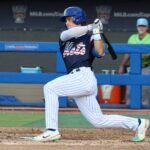The Johan Santana injury has spawned a variety of opinions on what the Mets strategy should be moving forward. With reports and speculation having Johan Santana miss from as little as six months to as long as two years, it’s difficult to predict how the Mets will act this offseason, but their recent history does speak volumes.
In 2009, the Mets never did anything to replace Carlos Delgado, their biggest power threat, after he underwent surgery in May. The trade deadline came and went with the Mets brass telling fans that Delgado’s eventual return in 2-3 weeks will be far better than any player that was available. Delgado still has not played in a Major League game in the 15 months since that claim.
They have taken that same posture each time a significant player has gone down to injury, including Pedro Martinez in 2007, Jose Reyes in 2009, and Carlos Beltran in 2009 and again in 2010.
The Mets spin doctors will be out in full force regardless of who the GM and manager will be regarding Johan Santana. Up until the days preceding Opening Day, the Mets will keep up the pretense that Johan Santana will be the team’s ace and make his start on Opening Day in an attempt to fill seats and avoid a half-filled house to start the season.
That’s probably what the Mets will do, but of course there’s no shortage of opinions of what the Mets “should” do. Ted Berg for one, says that the lesson of Johan Santana is that the Mets should not pursue Cliff Lee because of his age, 32, and contract demands.
While I prefer that the Mets avoid engaging Cliff Lee for other reasons, I disagree with any team taking a posture like that to fill a critical need for the team.
What happened to Johan Santana would be devastating to any organization, but a good GM shouldn’t manage his team with fear as a strategy. He should never cut himself off from signing any free agent that would improve the team, especially in a market with competitors like the New York Yankees and division rival Philadelphia Phillies in close proximity. To maintain a competitive advantage, you do so by expanding your options and reach in the market and not by minimizing them.
One other thing to remember is that a player will get paid whatever the current economic climate and market will bear, like it or not. No team wants to give any pitcher a five or six year contract if they can help it. It poses a great risk no matter how young or old the pitcher is as Stephen Strasburg has shown this season. However, quality pitchers will continue to get long-term contracts if their recent performance warrants it. It’s always been that way, and there’s nothing to suggest that it’s going to change anytime soon. Injuries do not discriminate based on age.
I hope the next Mets GM realizes the importance of maintaining a progressive outlook when dealing in future free agent markets, and that he keeps a very close eye on what our division rivals do, much like top-notch organizations as the Angels, Red Sox and Yankees.
I hope that our new GM understands that only in very rare cases should a player be labeled as untouchable, and that having 12-15 such players in your organization is simply a doomed strategy, especially when most of them have yet to play in a Major League game. Baseball has shown time and time again, that a bird in the hand is almost always worth more than two in the bush.
Even with the injury, can anyone say the Mets got burned for trading too many propsects to get Johan Santana? Did the Mets regret trading Mike Jacobs for Carlos Delgado who carried them to the postseason in 2006?
As far as core players go, I’m not suggesting that the Mets go out and trade David Wright and Jose Reyes simply for the sake of making a trade. What I am saying is that a good GM should have an idea of what these players are worth as far as a return, and if that return makes the team better, than by all means consider it.
I’m tired of watching this team rank among the leaders in payroll with little to show for it.
May I suggest that the new GM considers treating our players better and always with respect and dignity. Please listen to them when they say they are in pain and stop reacting so slowly to diagnose the source of their pain. Waiting a week and hoping they feel better is not a sound medical approach and yet despite the continuing disasters, the Mets continue to handle all injuries in this manner unless the player literally slumps over in pain on the playing field.
I believe that if the Mets simply treated their players better, they may not have to overpay as much as they do to get free agents to sign here. It’s imperative that the new regime focuses their efforts on eliminating the negative aura that permeates throughout every level of this organization. The Mets have a tremendous image problem, and it’s just as important for the new General Manager to fix that as it is to improve the roster. It’s going to take a lot more than just some spit and polish, and it could take years, but we have to start projecting a positive image… It’s imperative.
There’s an organizational problem that I’ve noticed with many of our minor league prospects. These players come to the Major League’s very unpolished in the way of basic baseball fundamentals. I don’t understand why this is, but it could be a combination of poor coaching in the lower levels and the Mets’ persistence in rushing young players to the majors before they are ready.
Just look at Ruben Tejada, Dillon Gee, Jenrry Mejia, Ike Davis, Nick Evans and Lucas Duda… none of them have ever spent a full season in AAA. Is it a surprise why so many of the hitting prospects have such high strikeout totals and why our pitching prospects all struggle to throw strikes? It’s not rocket science. To make an analogy, would you pick a peach off a tree while it was still green and before it was ripe? Would you serve it to your guests?
A great baseball organization is built on a solid foundation; their farm system. Our next GM must set new priorities and protocols that will ensure that our prospects hit the ground running. They must be ready to succeed instead of doomed to fail. Our minor league system is the lifeblood of our organization. We don’t have the cash resources that the Yankees do, which makes it doubly important to understand the importance of operating our minor league system at the highest level. Eliminate the slot system and draft the best available talent and not the most signable talent. Invest more dollars in the draft. It is unacceptable to be ranked in the bottom of all MLB teams in that regard for five consecutive seasons.
There are a few more qualities I would love to see in our new general manager. But if he simply does those few things that I have suggested, I would be more than thrilled, and it would be a significant improvement, a remarkable achievement, and a sign of greater things to come.













